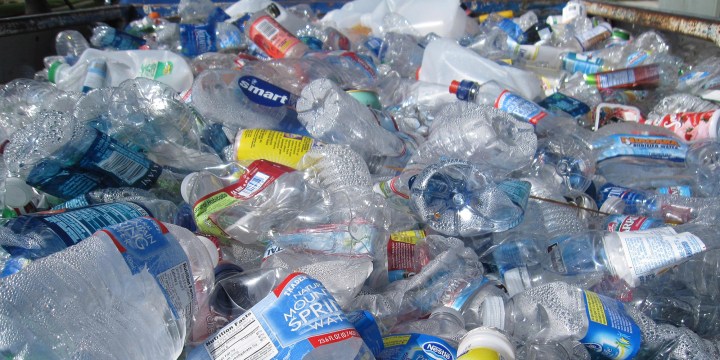ISS TODAY
Plastic smuggling leaving trails of environmental devastation across Cameroon

The steady flow of illegal non-biodegradable plastic into the country harms the environment, economy and public health.
The smuggling of prohibited plastic into Cameroon threatens the environment, public health and the agricultural sector. It is driven by increasing demand due to the high price of legal alternatives. And although customs officials are actively seizing contraband that enters through the country’s porous borders, government counter-measures are proving largely inadequate.
The manufacturing, possession, sale and free distribution of thin, non-biodegradable plastic and the granules used to make it are forbidden in Cameroon. Violators face between two and 10 years in jail with fines of up to $20 ,000. But despite the ban and stiff sentences for offenders, illicit plastic packaging continues circulating in Cameroonian markets. The bags are relatively cheap to produce and buy and can be disposed of easily.
Plastic bags with a density of 60 microns or less decay slower than thick ones, taking up to 400 years to decompose. Even then, they break down into smaller toxic particles that contaminate the environment. And packaging hot food in thin plastic is dangerous because it emits inedible petroleum substances that cause long-term health problems for consumers.
According to statistics from the Ministry of Environment, Nature Protection and Sustainable Development, non-biodegradable waste represents about 10% of the six million tonnes of garbage generated daily in Cameroon. A considerable portion of this waste is a byproduct of smuggled polythene materials (plastic).
Traders from neighbouring countries, including Nigeria and Gabon, smuggle the prohibited bags into Cameroon hidden in legal shipments or haul them across the border on footpaths. The smuggling chain includes wholesalers and government officials embedded in the criminal economy. Some police willingly take bribes, while others are corrupted by dealers who negotiate the release of their wholesalers and contraband after arrests and confiscations.
Non-biodegradable plastic waste is dumped indiscriminately, obstructing waterways in major cities. This has caused widespread flooding, which spreads vector diseases such as malaria and cholera.
Visit Daily Maverick’s home page for more news, analysis and investigations
Plastic also prevents water from draining into the soil, stunting root development and diminishing agricultural production. It has led to the death of cattle, especially in northern Cameroon, where free-grazing livestock have eaten plastic waste strewn over pastures.
Increasing records of seizures indicate that customs officials are carrying out their border policing and port surveillance duties. In 2014 and 2015, over 200 people were arrested for smuggling plastic into the country. The operations, which led to the impounding of 60 tonnes of contraband worth over $483,000, were carried out by the environment ministry, customs officials and the Ministry of Trade in the Southwest Region.
In 2019, customs officials seized 8.4 tonnes of non-biodegradable plastic bags, and in April 2020, 50 tonnes concealed in bags of chilli and tea were confiscated in the Northern Region. In September 2020, 800kg of illicit plastic bags smuggled from Nigeria were impounded in Maroua, capital of the Far North Region. In September 2021, government officials destroyed 42 tonnes of non-biodegradable plastics in Garoua in the North Region.
Despite these successes, government measures haven’t succeeded in curbing the problem. Political will is lacking to drive law enforcement and environmental solutions to the criminal economy. To counter the smuggling, border controls and international police cooperation with Nigeria and Gabon, as countries of origin for the contraband, must be reinforced.
Longer-term approaches to environmental governance are just as vital. First, the government needs to increase the production of inexpensive and versatile alternatives to non-biodegradable plastic. Businesses that focus on eco-friendly innovation and a circular economy — which involves reusing, refurbishing and recycling materials for as long as possible — should be supported by the state. This calls for a shift in thinking, say environmentalists.
Second, sustained public education should accompany enforcement of the ban on illicit plastics. Cameroon’s local councils are meant to ensure development and improve living conditions by formulating, implementing and monitoring environmental action plans. The central government should task urban and rural councils with running public awareness campaigns and help fund them.
These solutions would lower the demand for non-biodegradable plastics, which may reduce the incentive for smuggling. DM
Oluwole Ojewale, Regional Organised Crime Observatory Coordinator – Central Africa, ENACT, Institute for Security Studies (ISS).
First published by ISS Today
This article was produced by Enact. Enact is funded by the European Union and implemented by the Institute for Security Studies and Iinterpol, in affiliation with the Global Initiative against Transnational Organised Crime.





















 Become an Insider
Become an Insider
Comments - Please login in order to comment.